By Ehichioya Ezomon
Five months plus to the 2023 general election, Delta State Governor and Vice Presidential candidate of the Peoples Democratic Party (PDP), Dr Ifeanyi Okowa, is firing on all cylinders, thus belying his irreproachable mien. As he promotes the qualities that recommend former Vice President Atiku Abubakar for the presidency, and what he’ll do if elected on February 28, 2023, Okowa deploys the military tactic of offense and defense.
He takes on the candidates and running mates of other major parties, and gives Atiku the needed alibi to tackle his “disagreement” with Rivers State Governor Nyesom Wike, arising from Atiku’s pick of Okowa as running mate. If we may ask: Isn’t that partly what Atiku “hired” Okowa to do while listing the qualities of a vice president at his unveiling of the governor on June 26, 2022?
Atiku had said: “You (Nigerians) know him (Okowa) to be a fighter; you know him to care about winning (elections); you know him to care about good governance; and you know him to care about our people.” And that’s the groundwork Okowa is laying early on in the processes leading to the presidential poll that’s a must-win for the PDP to regain power nationally since 2015.
As the only incumbent governor in the run for the presidency, the medical doctor-turned politician occupies a unique position among the vice presidential candidates, and so has a lot to prove, to justify the confidence Atiku reposed in him, and silence his doubters that he’s a capable pick in politicking, winning elections and governing therefrom. On that score, Okowa’s first outing was a viral interview with BBC pidgin, dismissing candidate Peter Obi of the Labour Party as insufficiently experienced for the job of president.
Okowa obliquely asked the former Anambra governor (2006-2014) to take tutorials from Atiku, the vice president under President Olusegun Obasanjo (1999 to 2007). “For them (Obasanjo and Atiku) to have handled the economy at that time and made it something better, offering hope, creating jobs, and filtering the society was not easy because it’s a bigger thing,” Okowa said.
“So someone is supposed to learn through that. If you look at Obi’s experience, you’ll know it’s small… It is not enough for this one (2023 presidency); it will be hard. His experience is not deep enough. That is why I am appealing to our youths to be wise and vote well; they should not be blinded by the concept of a false change because that is how they raved on (former President Goodluck) Jonathan in 2015,” Okowa adds.
Okowa has also taken on candidate Bola Ahmed Tinubu of the All Progressives Congress (APC), who, responding to Atiku’s criticism of his picking a fellow Muslim, former Borno State Governor Kashim Shettima as running mate, rated Shettima as more qualified than Okowa. But Okowa, scoring himself above Shettima in whatever parameters, respectfully advised the former Lagos State governor to leave the trivial, and address Nigeria’s myriad problems, the collapsing APC, and the many unsavoury issues surrounding Tinubu’s candidacy.
Okowa laughed off Shettima’s pledge on August 22, at the Nigerian Bar Association Annual General Conference in Lagos, that if elected vice president, he’d take care of security, while Tinubu would handle the economy. Questioning Shettima’s knowledge of the duties of the Commander-in-Chief, Okowa lectured him: that security is the responsibility of Tinubu if elected as the president.
Okowa noted Shettima’s failure to stem the Boko Haram insurgency under his government (2011 to 2019), leading to abduction of 276 Chibok schoolgirls in April 2014. Okowa’s returned to Obi’s presidential run lately, accusing him of dragging the church into politics, by visiting worship centres, where he’s received as a rock star. Engaging newsmen in Kano on August 31, as part of the delegation that received former Kano State Governor Ibrahim Shekarau into the PDP on August 29, Okowa deplored Obi’s novel fraternising with the church.
“Now, you begin to look at what is going on; the Peter Obi factor is as if he is trying to go through the church and make it look as if he is driving the Christians into politics,” Okowa says. “I do not believe that the church should actively go into politics because that is not their calling.
“But people are just hanging to anything they can reach out to even to the detriment of their fate (faith). I don’t believe that’s the right path to go,” Okowa adds.
But Obi, via his campaign media office – Obi-Datti – on September 1, described Okowa’s charge as baseless, and an attempt to label him (Obi) as belonging to the country’s “primeval politics, religion, tribe, and geography.”
Stressing that any attempts to pigeonhole him into any sector of the national life “will fail,” Obi reminded Okowa that he’d visited churches “even before he became (began) the present run for the presidency,” citing one of such visits as during “Dr Okowa’s child’s wedding at the National Ecumenical Conference Centre, Abuja, this year.”
Yet, Okowa doesn’t just trouble-shoot, promote and defend Atiku, but he also showcases his own experiences, and what he’ll bring to the Office of the Vice President. Okowa’s run the gamut of political offices as Secretary, and Chairman of Local Government Area; political party Senatorial Coordinator; Commissioner in three ministries; Secretary to the State Government; Senator of the Federal Republic; Governor for eight years (2015-2023); and Vice Presidential candidate going into the 2023 polls.
Besides the National Economic Council (NEC) that’s placed under the Vice President, Okowa’s cut out work for himself in the nation’s problematic health sector. Having practiced in the public and private health sectors, Okowa deployed the experiences to craft a Bill at the National Assembly that culminated in the establishment of the National Health Insurance Scheme (NHIS). The NHIS that’s beneficial to Nigerians, especially free medical care for the young and elderly, has improper implementation of underfunding and corruption, but it’s running smoothly in Delta State, courtesy of Okowa, who’s promised to fix the scheme at the federal level.
Okowa equally flaunts his managerial skill in the field of Education, particularly overseeing four Universities, without incessant strikes by the institutions’ unions. Whereas the Academic Staff Union of Universities (ASUU) has extended its six-months’ “warning strike” to a full-blown indefinite protestation, the non-academic staff unions only lately called-off their three-month-old strike.
Hence Okowa’s invited the Federal Government to take a cue from how he’s coping with funding the varsities, and the welfare of their Academic and Non-academic staff. Okowa has also drawn attention to his concession of the Asaba International Airport, and wants the government to emulate him, and free the national airports of its control. With these and more offerings Okowa’s is bringing to the table, what other Vice Presidential candidate could Atiku ask for in the journey to the Villa that looks a heartbeat away from February 25, 2023.























